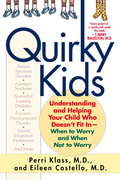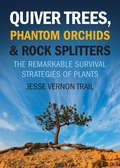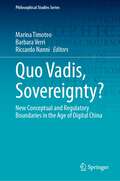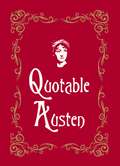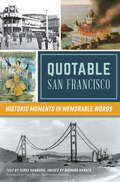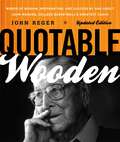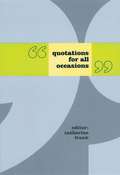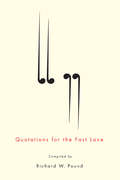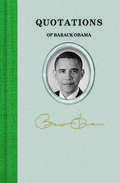- Table View
- List View
Quirky Kids: Understanding and Helping Your Child Who Doesn't Fit In- When to Worry and When Not to Worry
by Perri Klass Eileen CostelloThe toddler whose tantrums scare all the other kids on the playground . . . The three-year-old who ignores all his toys but seems passionately attached to the vacuum cleaner . . . The fourth-grade girl who never gets invited to a birthday party because classmates think she’s “weird” . . . The geek who is terrific at math, but is failing every other subject. Quirky children are different from other kids in ways that they–and their parents and teachers–have a hard time understanding or explaining. Straddling the line between eccentric and developmentally impaired, quirky children present challenges that standard parenting books fail to address. Now, in Quirky Kids, nationally known writer/pediatrician Perri Klass and her colleague Eileen Costello, a seasoned pediatrician with a special interest in child development, finally provide the expert guidance and in-depth research that families with quirky children so desperately need.A generation ago, such children were called odd ducks or worse. But nowadays, they are often assigned medical, psychiatric, or neurological diagnoses. The diagnoses often overlap or shift, but the labels can be frightening. Klass and Costello illuminate the confusing list of terms applied to quirky children these days–nonverbal learning disability, sensory integration disorder, obsessive-compulsive behavior, autistic spectrum disorder, pervasive developmental disorder, Asperger’s syndrome–and explain how to assess what exactly each diagnosis means and how to use it to help a child most effectively. Quirky Kids takes you through the stages of a child’s life, helping to smooth the way at home, at school, even on the playground. How do you make it through mealtime, when emotions often erupt? How do you help the child’s siblings understand what’s going on? Is it better to “mainstream” the child or seek a special education program? How can you make a school more welcoming and flexible for a quirky child? How do you help your child deal with social exclusion, name-calling, and bullying? Choosing the right therapy for quirky children is especially difficult, because their problems fall outside traditional medical categories. Coping strategies might include martial arts or horseback riding, or speech and occupational therapies. Klass and Costello cover all the options, as well as offer a thorough consideration of the available medications, how they work, and whether medication is the best choice for your child. Drs. Klass and Costello firmly believe that the ideal way to help our quirky kids is to understand and embrace the qualities that make them exceptionally interesting and lovable. Written with upbeat clarity and informed insight, their book is a comprehensive guide to loving, living with, and enjoying these wonderful if challenging children.From the Hardcover edition.
Quiver Trees, Phantom Orchids & Rock Splitters: The Remarkable Survival Strategies of Plants
by Jesse Vernon Trail&“Showcases the many weird and wonderful ways plants adapt to survive and spread their progeny . . . A great book for anyone interested in botany&” (The Gardener). Whether it&’s an arctic heather that can create subtropical conditions within its leaves, or a dwarf mistletoe that can shoot its seeds up to fifty feet away, plants demonstrate remarkable strategies in coping with and surviving their environments. Plants are often exposed to bitter cold, relentless winds, intense heat, drought, fire, pollution, and many other adverse growing conditions. Yet they are still able to survive and often even thrive. This book showcases these exceptional plants with absorbing information and stunning photos that will inspire a new respect for nature&’s innovation and resilience. &“From hummingbirds on the high slopes of the Andes to sugarbirds on the South African Cape, Vernon takes the reader on an awe-inducing journey to discover the secret life of pollinators and the plants that depend upon them. . . . You&’ll delight in the surprising, unusual, and downright amazing strategies plants use to cope and copulate.&” —Sierra
Quo Vadis, Sovereignty?: New Conceptual and Regulatory Boundaries in the Age of Digital China (Philosophical Studies Series #154)
by Marina Timoteo Barbara Verri Riccardo NanniThis book presents an interdisciplinary exploration of digital sovereignty in China, which are addressed mainly from political, legal and historical point of views. The text leverages a large number of native Chinese experts among the authors at a time when literature on China’s involvement in internet governance is more widespread in the so-called “West”. Numerous Chinese-language documents have been analysed in the making of this title and furthermore, literature conceptualising digital sovereignty is still limited to journal articles, making this one of the earliest collective attempts at defining this concept in the form of a book. Such characteristics position this text as an innovative academic resource for students, researchers and practitioners in international relations (IR), law, history, media studies and philosophy.
Quotable Austen (Quotable Ser.)
by Max MorrisThese entertaining collections gather together the wisest and wittiest quotations from some of Britain’s best-loved historical figures. Packed with humorous, perceptive and compelling quotes, they are sure to delight readers everywhere.
Quotable Austen: Memorable Quotes from Our Favourite Writer
by Max MorrisCelebrating Jane Austen's 250th birthday, this book is a charming collection of notable quotes from her most celebrated nineteenth-century novels A fine collection of the wisest and wittiest quotes from one of the most beloved and prominent British writers of all time, this book is sure to win you over with Jane Austen's ability for turning typical people and mundane events into charming and relatable stories. With over 140 quotes from her completed novels - Sense and Sensibility, Pride and Prejudice, Mansfield Park, Emma, Northanger Abbey and Persuasion - this book is the perfect opportunity for readers to immerse themselves in the refinement of the Regency era.Austen was well known for her astute social observation and keen insight into the lives of women in the early nineteenth century. This collection will urge you to:- Ardently admire and love- Feel the pangs of disappointed love - Find comfort in words of wisdom- Acquaint yourself with the refinements of polished society- Learn witty comebacks to leave your friends speechlessAfter all, it is a truth universally acknowledged that this would be the ultimate gift for Janeites and Austenites.
Quotable Churchill: Inspiring Quotes from a British Hero
by Summersdale PublishersCelebrate the wit and wisdom of Winston Churchill with this collection of inspiring quotes. This compilation features over 140 of Winston Churchill's wittiest remarks and sagest sayings. With quotes on life, education, philosophy and more, this book is a celebration of the former prime minister's famous oratorical skills.
Quotable Churchill: Inspiring Quotes from a British Hero
by Summersdale PublishersCelebrate the wit and wisdom of Winston Churchill with this collection of inspiring quotes. This compilation features over 140 of Winston Churchill's wittiest remarks and sagest sayings. With quotes on life, education, philosophy and more, this book is a celebration of the former prime minister's famous oratorical skills.
Quotable Elizabeth Warren
by Frank MarshallUS Senator Elizabeth Warren has long been an original thinker and a powerful voice for the common man. Having worked her first job at the age of nine and witnessed first-hand the economic struggles of the American middle class, Warren never hesitates to tell the truth about the US economy. She has been a strong advocate for consumer protection; her work has led to the creation of the US Consumer Financial Protection Bureau.Discover in her own words the woman who has been called "a New Sheriff of Wall Street" by TIME magazine, and "the plainspoken voice of people getting crushed by so many predatory lenders and under regulated banks" by the Boston Globe."There is nobody in this country who got rich on their own. Nobody. . . . Part of the underlying social contract is you take a hunk of that and pay forward for the next kid who comes along.""Hardworking men and women who are busting their tails in full-time jobs shouldn't be left in poverty.""If you're caught with an ounce of cocaine, the chances are good you're going to jail. . . Evidently, if you launder nearly a billion dollars for drug cartels and violate our international sanctions, your company pays a fine and you go home and sleep in your own bed at night."
Quotable General
by Monte CarpenterBobby Knight spent nearly 30 years as the controversial yet incredibly successful head basketball coach at Indiana University.
Quotable Hogan
by Rich SkyzinskiBen Hogan continues to be one of the most admired and contemplated figures in the golf world, even though he passed away in 1997 and played his last competitive round of golf 30 years ago.
Quotable Michael Jordan: Words of Wit, Wisdom, and Inspiration by and about Michael Jordan, Basketball's Greatest Superstar
by Pat WilliamsJordan's quotability is incredible, as are the dozens of compelling anecdotes contained in this special keepsake.
Quotable New Englander: Four Centuries of Wit and Wisdom
by Eric D. LehmanFrom the Mayflower&’s landing to the age of the internet, New Englanders have always had something to say. Focusing on the unique qualities of both land and people, The Quotable New Englander showcases the linguistic insight of the region&’s native and adopted sons and daughters, from writers like Emily Dickinson to politicians like John F. Kennedy. Sometimes insightful, sometimes hilarious, these quotes will have readers smiling, laughing, and shaking their heads.
Quotable Quotes
by Editors of Reader's DigestA thorough revision and update of the best-selling Reader's Digest original Quotable Quotes will bring this timeless classic into the 21st century. The new collection will feature words of wisdom, wry witticisms, provocative opinions, and inspiring reflections from history's greatest figures, such as Benjamin Franklin, William Shakespeare, Socrates, Abraham Lincoln and scores more. It will also contain the best quips and quotes from modern celebrities like Colin Powell, Garrison Keillor, John Stewart, Steve Jobs, J.K. Rowling, Stephen King, Conan O'Brien, Jerry Seinfeld, Barack and Michele Obama, Lady Gaga, and well beyond.Sometimes all it takes is a poignant observation to turn our entire outlook on a topic, or even life itself, upside down. Whether readers are looking to polish a speech, get a quick laugh, or be inspired by the wisdom of the world's greatest minds, Quotable Quotes will provide them with unique insights and revelatory perceptions. With this up-to-date yet timeless edition, this book will have relevance for all readers, old and young, on subjects that range from life to the universe and everything in between: family, friends, work, death, taxes, religion, the modern world, literature, pop culture, and more. "Our belief was that if we kept putting great products in front of customers, they would continue to open their wallets" --Steve Jobs "The world is more malleable than you think, and it's waiting for you to hammer it into shape." --Bono
Quotable Quotes: Wit And Wisdom From The Greatest Minds Of Our Time
by Reader'S DigestA wide-ranging collection of inspirational, humorous, powerful, relatable, witty, and eminently quotable quotes for every occasion.Book Description: Featuring a carefully selected array of Quotable Quotes from the beloved Reader&’s Digest column, this giftable and eclectic collection of inspiring, funny, and memorable words has something for everyone to enjoy. The thoughtfully chosen quotes from famous figures in the arts, sports, politics, and more cover myriad topics, including: Friendship &“Lots of people want to ride with you in the limo, but what you want is someone who will take the bus with you when the limo breaks down.&” —Oprah Success &“My father used to say, &‘If you want to be different, do something different.&’&” —Wynton Marsalis Wisdom &“Wisdom outweighs any wealth.&” —Sophocles Attractively presented with attention and care, the witticisms and reflections in this book will motivate, inspire, entertain, and delight—just as Quotable Quotes always have.
Quotable Reagan: Words of Wit, Wisdom, Statesmanship By and About Ronald Reagan, America's Great Communicator
by Steve EubanksFormer President Reagan, long remembered as the Great Communicator, never was at a loss for words, and his profound wisdom and wit are presented in this unique, impactful book covering more than fifty years from Hollywood to 1600 Pennsylvania Avenue and beyond.
Quotable San Francisco: Historic Moments in Memorable Words
by Terry HamburgA treasury of quotes from San Franciscans and about San Francisco, from the gold rush to the tech boom. San Francisco is forty-nine square miles surrounded by reality. —Paul Kantner, Jefferson Airplane San Francisco surged from hamlet to boomtown overnight—the most meteoric &“instant city&” in history. From the Gold Rush to the Tech Rush, it&’s been the site of daring innovations, counterculture upheavals, and social rebellions that shaped generations. And over the decades, residents have offered unique perspectives through journals, letters, and newspapers, their words bringing another time to life. Discover San Francisco through the eyes of miners and &“ladies of the night.&” Relive the experiences of robber barons and beatniks who flourished in a tiny corner of the world with fewer than one million souls. With commentary, historical background, and extraordinary images, historians Terry Hamburg and Richard Hansen guide you through these colorful quotes, showing the city as it once was and what it aspired to be.
Quotable Shakespeare (Quotable Ser.)
by Max MorrisThis entertaining collection gathers together William Shakespeare's wisest and wittiest quotations. Quotable Shakespeare proves that brevity is the soul of wit and is sure to delight all lovers of the Bard's uniquely perceptive and influential works.
Quotable Shakespeare (Quotable Ser.)
by Max MorrisThis entertaining collection gathers together William Shakespeare's wisest and wittiest quotations. Quotable Shakespeare proves that brevity is the soul of wit and is sure to delight all lovers of the Bard's uniquely perceptive and influential works.
Quotable Soldier (Quotable)
"The book provides familiar and not-so-familiar sayings that capture the chaos, challenges, and sacrifices of war."--Army magazineThe Quotable Soldier is a rich and balanced collection of the best quotations about war and those who go to war. From Thucydides to General H. Norman Schwarzkopf, here are the reasons men go to war, the challenge of human courage, the strategy of great battles and campaigns, the horrors of war, and much more. The Quotable Soldier includes comments about the battles of ancient times, through the Napoleonic and World Wars, and on into the complicated conflicts of Korea, Vietnam, and Desert Storm. This is one of the most compelling, challenging, and comprehensive collections of quotes about war and soldiering ever assembled.The perfect gift for any soldier, veteran, or war buff, The Quotable Soldier is a compulsively readable collection of some of the most illuminating observations ever made about war.
Quotable Spurrier: The Nerve, Verve, and Victorious Words of and about Steve Spurrier, America's Most Scrutinized Football Coach
by Gene FrenetteSteve Spurrier is the epitome of a national sports figure either loved or hated with enthusiasm by millions.
Quotable Wooden: Words of Wisdom, Preparation, and Success By and About John Wooden, College Basketball's Greatest Coach
by John RegerJohn Wooden was arguably the greatest college basketball coach of all time, a teacher as well as mentor whose handiwork produced a dynasty bridging the 1960s and 1970s. Quotable Wooden is a compilation of more than two hundred quotes by and about Wooden. Among the topics covered are his playing days at Purdue, his years at UCLA, his coaching philosophy, and his views on today's game. Other notables quoted in this inspiring book include Kareem Abdul-Jabbar, Bill Walton, Denny Crum, Dick Vermeil, and Rick Reilly.
Quotations for All Occasions
by Catherine FrankOn the most important occasions of our lives, we often find ourselves at a loss for words; when we want to console, celebrate, explain, inspire, or thank, we end up repeating such uninspiring, uninformative phrases as "Words cannot express how I feel." To help us find the right words, Catherine Frank has compiled this handy compendium of quotations that capture the mundane and the magnificent, the everyday and extraordinary moments of our lives.The three sections of the book cover 150 occasions. "Every Year" offers quotations on all the special dates in the calendar from New Year's Day to New Year's Eve, including Martin Luther King Day, Valentine's Day, Ramadan, Mother's Day, Thanksgiving, Kwanzaa, and Christmas. "Occasionally" presents quotations on such occasions as giving a speech, having an interview, becoming a parent, getting engaged, welcoming someone, and saying goodbye. "Once in a Lifetime" provides quotations on such momentous events as confirmation, coming out, turning 16, graduation, and retirement. A sampling: Plato, John Donne, and Woody Allen give their words of wisdom on death. Betty Ford writes eloquently on recovery. Martina Navratilova ruminates on her first sexual encounter... and Holden Caufield on his. Ralph Waldo Emerson, Mark Twain, and Frederick Douglass ponder Independence Day. Amy Tan reflects on the meaning of the Chinese New Year. Samuel Taylor Coleridge and Susan Sontag offer poignant descriptions of pain and illness.Whether you are offering consolation or congratulations, condolences or confessions, Quotations for All Occasions has the perfect words for every occasion.
Quotations for the Fast Lane
by Richard PoundRichard Pound has spent half a lifetime identifying, collecting, and organizing thousands of quotations. Quotations for the Fast Lane is the result of that effort, selected by someone with an impressive range of local, national, and international experience, and arranged alphabetically by theme to be easily accessible for all readers and all occasions. Words from personalities ranging from William Blake to Warren Buffett on all topics imaginable, serve to elevate and inspire. The great majority of the quotations in this book are pithy, often humorous and sardonic, but always containing an interesting perspective on life, conduct, and achievement. Quotations for the Fast Lane: "I have great faith in fools - my friends call it self-confidence." Edgar Allan Poe "It is better to be approximately right than precisely wrong." Warren Buffett "The last refuge of the insomniac is a sense of superiority to the sleeping world." Leonard Cohen
Quotations for the Fast Lane
by Richard W. PoundRichard Pound has spent half a lifetime identifying, collecting, and organizing thousands of quotations. Quotations for the Fast Lane is the result of that effort, selected by someone with an impressive range of local, national, and international experience, and arranged alphabetically by theme to be easily accessible for all readers and all occasions. Words from personalities ranging from William Blake to Warren Buffett on all topics imaginable, serve to elevate and inspire. The great majority of the quotations in this book are pithy, often humorous and sardonic, but always containing an interesting perspective on life, conduct, and achievement. Quotations for the Fast Lane: "I have great faith in fools - my friends call it self-confidence." Edgar Allan Poe "It is better to be approximately right than precisely wrong." Warren Buffett "The last refuge of the insomniac is a sense of superiority to the sleeping world." Leonard Cohen
Quotations of Barack Obama (Quotations of Great Americans)
by Barack ObamaBe inspired by quotations from Barack Obama, our 44th, and first African-American President of the United States, in this elegant hardcover edition. This collection of motivational and inspirational quotes will make you feel good about America. Featuring a portrait of President Obama on the front cover with his signature printed below in gold foil, this classic collection of Obama quotes will inspire everyone who opens its covers.
